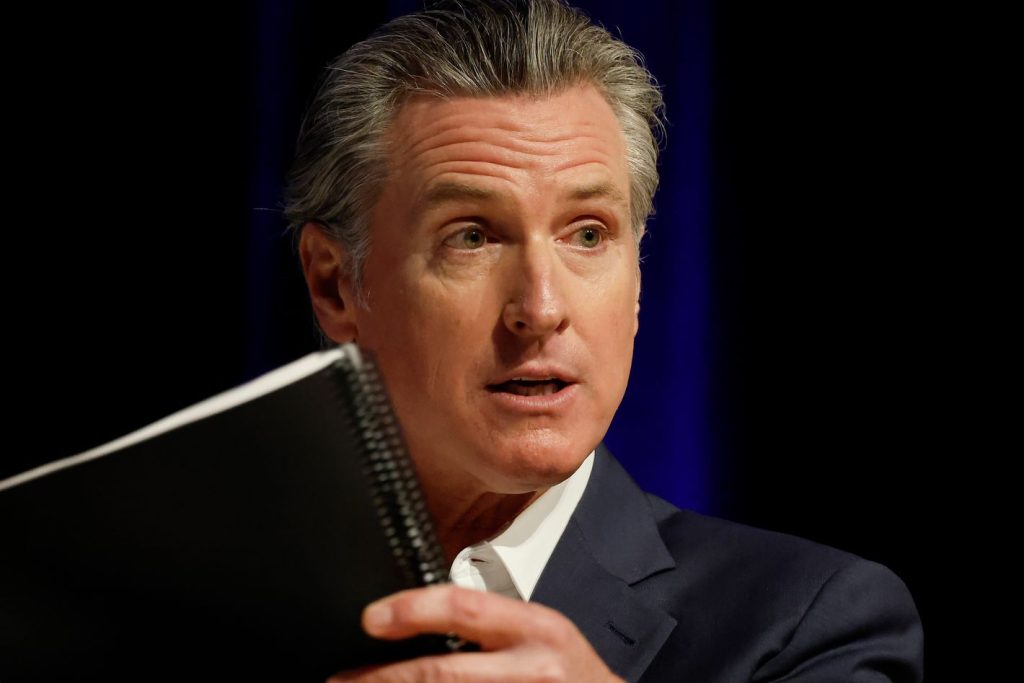Photo: Mario Tama/Getty Images
There’s not much question that Gavin Newsom and many other California Democrats hoped that their state could serve as a defiant alternative to the reactionary bent of the second Trump administration, one that proudly stands up for their party’s values. But fiscal realities (including many under the influence of their enemies in Washington) still matter, and a new announcement from Newsom, as reported by the Associated Press, illustrates the limits of state-based progressivism in the Trump era:
Gov. Gavin Newsom wants California to stop enrolling more low-income immigrants without legal status in a state-funded health care program starting in 2026 and begin charging those already enrolled a monthly premium the following year.
The decision is driven by a higher-than-expected price tag on the program and economic uncertainty from federal tariff policies, Newsom said in a Wednesday announcement. The Democratic governor’s move highlights Newsom’s struggle to protect his liberal policy priorities amid budget challenges in his final years on the job.
California was among the first states to extend free health care benefits to all poor adults regardless of their immigration status last year, an ambitious plan touted by Newsom to help the nation’s most populous state to inch closer to a goal of universal health care. But the cost for such expansion ran $2.7 billion more than the administration had anticipated.
The steady expansion of Medi-Cal, California’s Medicaid program, which is being at best “paused” right now, reflected two different but mutually reinforcing progressive values: a slow but stead crawl toward universal health-care coverage in the absence of a national single-payer system, and a concern for the needs of the undocumented immigrants who play so prominent a role in California’s economy and society. In particular, California Democrats have embraced the argument that health care should be a right, not some sort of earned privilege, in part because health insurance helps keep overall health-care costs down in the long run by promoting early detection and treatment of illnesses while avoiding expensive emergency-room care. Because federal Medicaid dollars cannot be used to provide services for undocumented immigrants, California (like six other states that cover significant numbers of adults, and 13 others who cover children) has used state dollars to pay for them.
California Democrats were in a position to expand Medi-Cal thanks to the legislative supermajorities they have enjoyed since 2018, which is also when Newsom became governor. But the latest expansion has proved to be fiscally unsustainable as statewide budget shortfalls loom. Newsom has been quick to attribute the latest budget woes to revenues losses caused by Trump’s tariff policies. But the broader problem is that, unlike the federal government, California must balance its budget, even though many of the factors influencing spending and revenues are beyond its control. And the problem is likely to get worse as the Trump administration and its congressional allies shift costs to the states, a major part of their strategy for reducing federal spending (to pay for high-end federal tax cuts).
There’s a specific emerging federal policy that probably influenced Newsom’s latest step: Congressional Republicans are very likely to adopt a punitive reduction in Medicaid matching funds for states that are using their own money to cover undocumented immigrants. The details are still under development, but the provision could hit California pretty hard.
Numbers aside, this episode represents a potential turning point in California’s progressive political trends, reflecting Trump’s better-than-expected showing in the Golden State in 2024 along with the passage of a ballot initiative increasing criminal penalties for drug and theft offenses and the rejection of an increase in the state’s minimum wage. There’s even some optimistic talk among California Republicans about breaking their long losing streak (dating back to 2006) in statewide elections next year (which is pretty unlikely given the high odds of an anti-Trump midterm backlash).
It’s also possible that the ever-ambitious Newsom doesn’t mind calibrating his own ideological image toward the perceived center in his final days as governor (he’s term-limited next year). He and other California Democrats can only hope that economic trends and what happens in Washington give them a choice in the matter.

